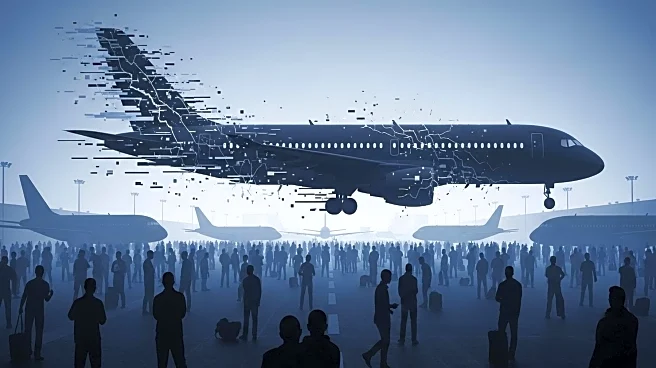What is the story about?
What's Happening?
Collins Aerospace, a company specializing in aviation and defense technology, experienced a cyber attack on its check-in systems, leading to significant flight delays and cancellations at major European airports including Heathrow, Berlin, and Brussels. The attack, which began on September 19, 2025, affected the company's passenger processing system used for electronic check-in and baggage drop-off. As a result, hundreds of thousands of passengers faced delays, with some flights being canceled. The UK Transport Minister, Heidi Alexander, acknowledged the issue and advised passengers to check with airlines before traveling. Brussels Airport requested airlines to cancel half of their flights due to the inability of Collins Aerospace to provide a secure version of its system. The cyber attack also impacted Dublin Airport, causing delays over the weekend.
Why It's Important?
The cyber attack on Collins Aerospace highlights vulnerabilities in critical infrastructure systems, particularly those related to aviation. The disruption has significant implications for the airline industry, affecting passenger travel and airport operations. It underscores the need for robust cybersecurity measures to protect against such attacks, which can lead to economic losses and inconvenience for travelers. The incident also raises questions about the security of centralized systems used across multiple airports, as noted by cybersecurity experts. The broader impact includes potential reputational damage to Collins Aerospace and increased scrutiny on cybersecurity practices within the aviation sector.
What's Next?
Efforts are underway to resolve the issue, with Collins Aerospace actively working to restore full functionality. The UK's National Cyber Security Centre is collaborating with the company, airports, and law enforcement to assess the impact. Airports are advising passengers to arrive early and use alternative check-in methods. The situation remains fluid, with ongoing monitoring and updates expected. Airlines and airports may need to implement additional security measures to prevent future incidents, and there could be increased investment in cybersecurity technologies.
Beyond the Headlines
The attack on Collins Aerospace may prompt a reevaluation of cybersecurity protocols within the aviation industry. It highlights the interconnected nature of global travel systems and the potential for widespread disruption from targeted cyber attacks. The incident could lead to policy changes and increased collaboration between governments and private companies to enhance cybersecurity resilience. Additionally, it may influence public perception of air travel safety and the reliability of technological systems used in airports.
















